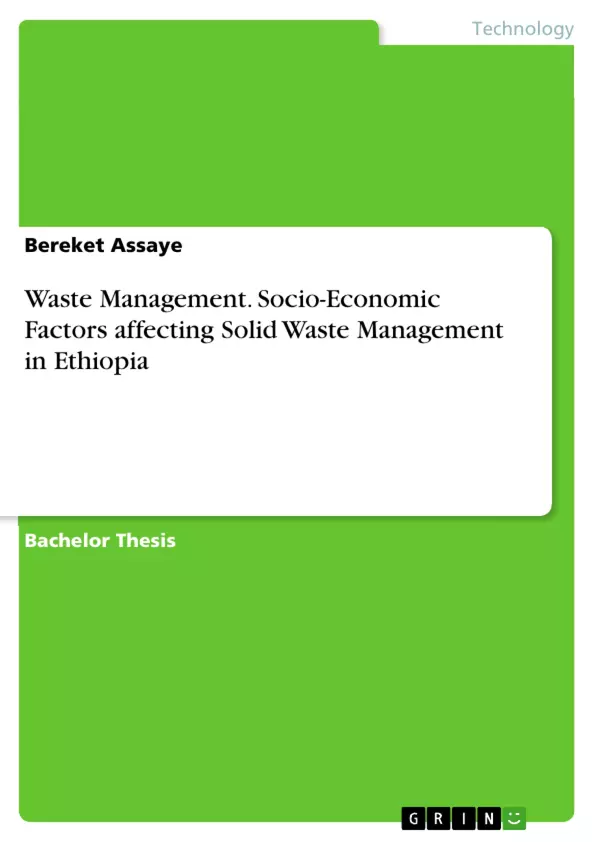The general objective of this study was to assess the socio-economic factors which affect solid waste management practices in Zenzelima Kebele.
The specific objective was to describe the current status of solid waste management practice in Zenzelima Kebele, to assess the correlation between income and educational level of Zenzelima Kebele and their solid waste management practice and to examine the associations of household size of the respondents on the Solid Waste Management.
Nowadays the population growth and the rate of urbanization are alarmingly increasing throughout the world including Africa. The population growth and urbanization are the major factor for the raising of solid waste in a country. There is also another factor such as cultural, social, economic and institutional for the increasing of solid waste in the world.
Table of Contents
- Acknowledgement
- Acronym/Abbreviation
- Table of Content
- List of Tables
- List of figure
- Abstract.
- Chapter One
- Introduction........
- Background of the study
- Statement of the problem.
- Objectives of the Study.
- General objective.
- Specific objective............
- Significance of the Study.
- Limitations of the Study.
- Scope of the Study..
- Chapter Two............
- Review of Literature
- Definition and concept of solid waste..
- Types and sources of solid wastes.
- Types of solid waste
- Sources of Solid Waste
- Solid Waste Management in Developing Countries.......
- Solid Waste Management in Ethiopia...
- Solid Waste Management Actors.
- The Municipality..
- The Private Sector.
- Community
- Solid Waste Management Problems in Ethiopia..
- Types of Solid waste Management system.
Objectives and Key Themes
This research project aims to investigate the socio-economic factors that affect solid waste management practices in Zenzeli Kebele, Bahir Dar Zuria Woreda, Ethiopia. The study explores the challenges and opportunities associated with solid waste management in a developing country context.
- Socio-economic factors influencing solid waste management practices.
- Challenges faced by communities in managing solid waste.
- Impact of solid waste management on the environment and public health.
- Potential solutions and strategies for improving solid waste management.
- Role of community participation in solid waste management.
Chapter Summaries
Chapter One provides an introduction to the study, outlining the background, problem statement, objectives, significance, limitations, and scope of the research. The chapter sets the stage for the investigation by providing contextual information about solid waste management in Ethiopia.
Chapter Two delves into a comprehensive review of literature on solid waste management. The chapter explores the definition and concept of solid waste, types and sources of solid waste, solid waste management in developing countries, and the challenges and issues associated with solid waste management in Ethiopia.
Keywords
The key terms and concepts explored in this research project include solid waste management, socio-economic factors, environmental impact, public health, community participation, developing countries, Ethiopia, and sustainable development.
- Arbeit zitieren
- Bereket Assaye (Autor:in), 2017, Waste Management. Socio-Economic Factors affecting Solid Waste Management in Ethiopia, München, GRIN Verlag, https://www.grin.com/document/919812



